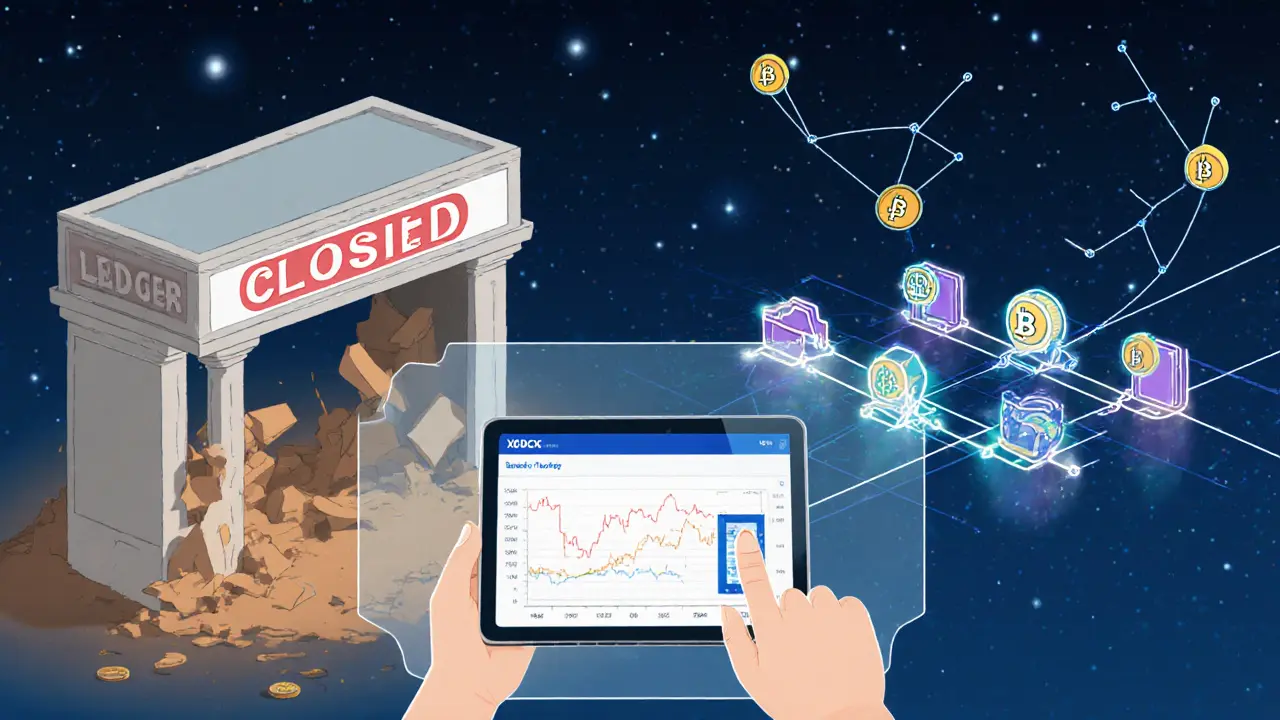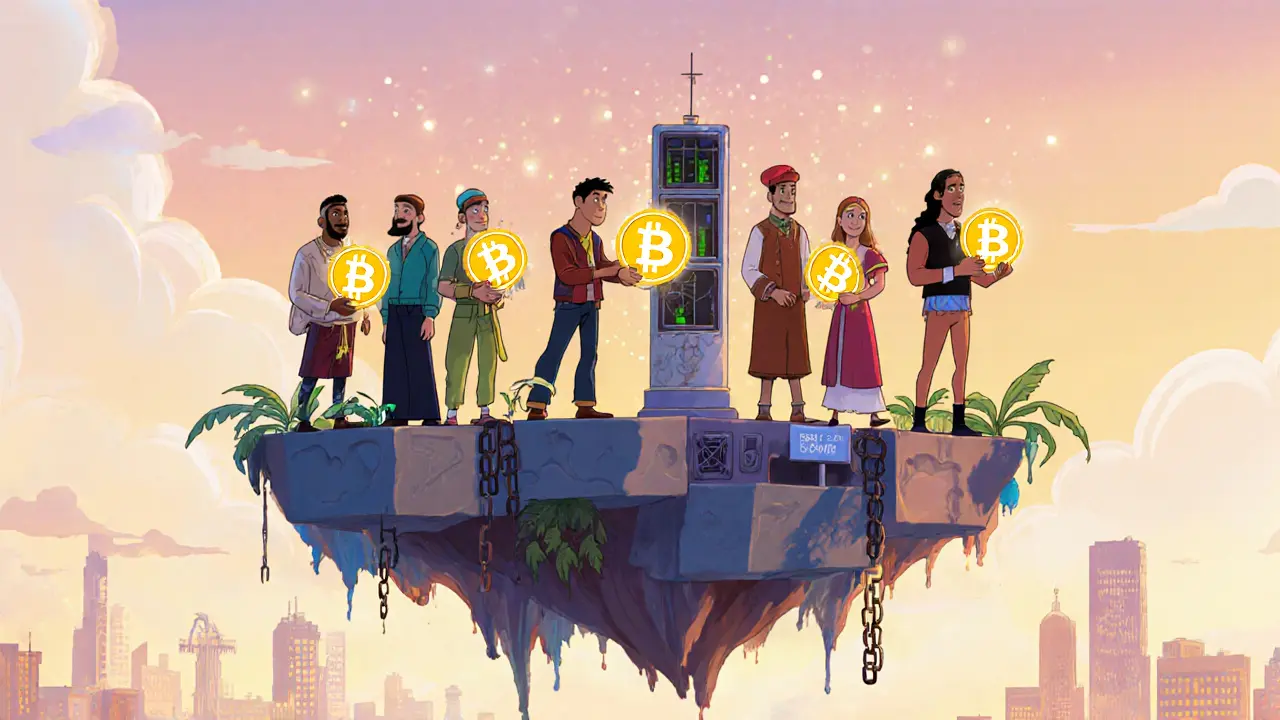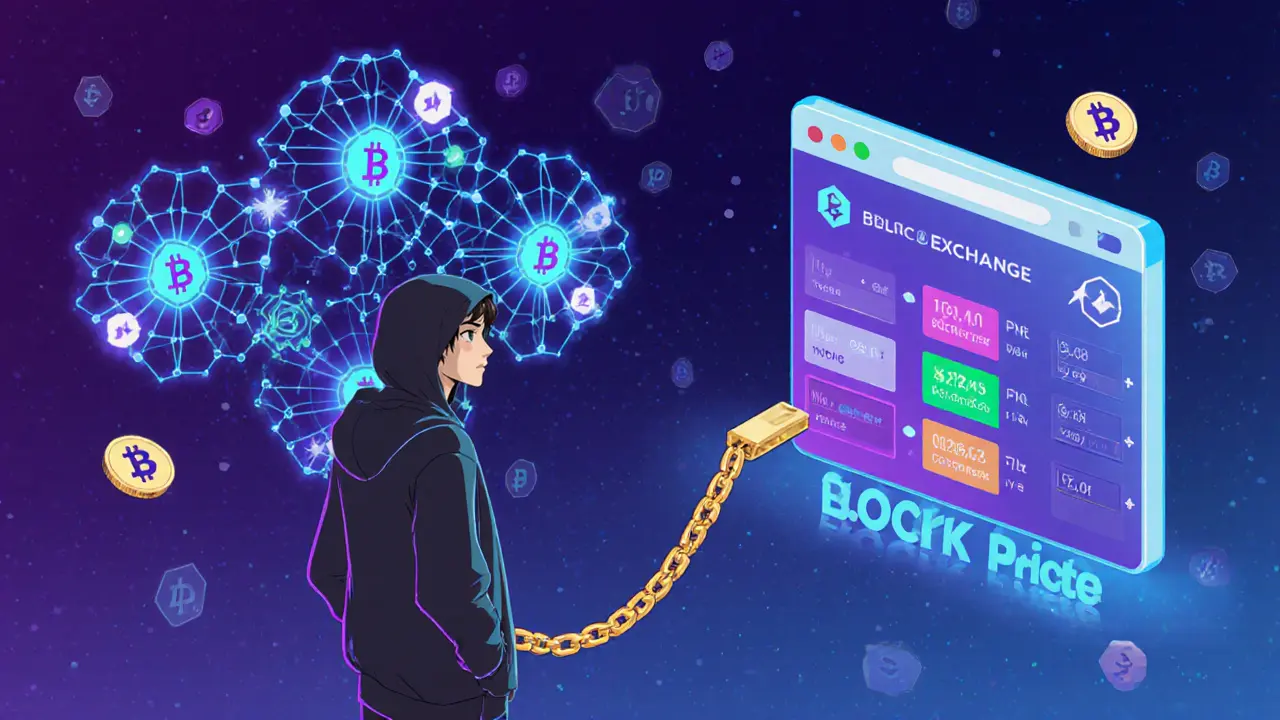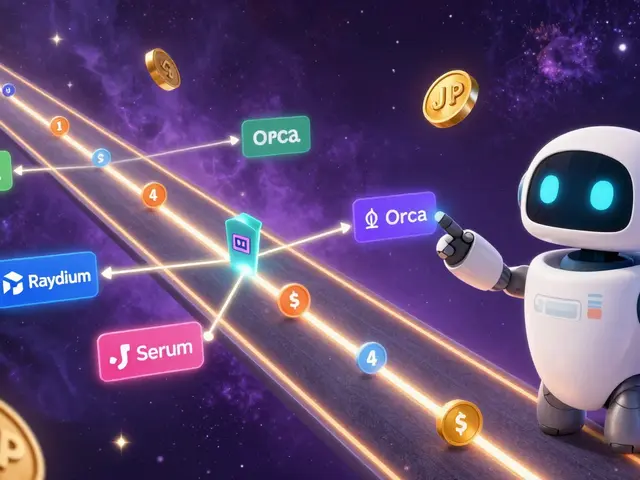BLOCK Token Staking Calculator
Staking Calculator
Estimate your potential earnings from staking BLOCK tokens on Block DX.
Your Estimated Earnings
Most crypto exchanges claim to be decentralized. But how many actually let you keep full control of your money? Block DX says it’s different. It doesn’t just say it - it built its whole system around removing middlemen. No KYC. No custodial wallets. No central server that can get hacked or shut down. If you’re tired of centralized exchanges freezing accounts or disappearing overnight, Block DX might be worth a closer look.
What Makes Block DX Different?
Block DX doesn’t just use blockchain tech - it rebuilds the entire exchange from the ground up using the XBridge Protocol a custom decentralized infrastructure that handles funds storage, order books, matching, and settlement without any central authority. Most so-called decentralized exchanges still rely on centralized order books or off-chain matching. Block DX says it doesn’t. Every part of the trade - from placing your order to settling it - happens on-chain, directly between wallets.
This isn’t just marketing. It means your funds never leave your wallet. You don’t deposit crypto into an exchange account. You connect your wallet - MetaMask, Ledger, or any EVM-compatible one - and trade directly. No one holds your keys. No one can freeze your account. If you lose your private key, there’s no customer service to help you. That’s the trade-off.
The BLOCK Token: Powering the Network
Block DX runs on its own native token: BLOCK the utility token required for all network fees, staking, and service node operation. You can’t pay trading fees in Bitcoin or Ethereum. You need BLOCK. Every trade, every withdrawal, every order placement costs a small amount of BLOCK. That creates real demand for the token.
But here’s where it gets interesting: you can earn BLOCK just by holding it. The network rewards users who stake BLOCK tokens by solving blocks - similar to mining, but without specialized hardware. The more BLOCK you hold, the higher your chance of being selected to validate a block. For every block you solve, you get 1 BLOCK token as a reward.
There’s also a higher tier: service nodes. If you want to run a service node and earn a share of trading fees, you need at least 5,000 BLOCK tokens locked up. That’s not small change. At current prices, that’s several thousand dollars. But it’s designed to align incentives - the people who run the network are the ones with the most skin in the game.
How It Compares to Other Decentralized Exchanges
Block DX isn’t the only player in decentralized trading. In 2025, the field is crowded. SushiSwap a popular DeFi DEX with $100M+ daily volume, supporting Ethereum, Polygon, Arbitrum, and more offers deep liquidity and a polished interface. dYdX a leader in decentralized margin trading, with advanced order types and high performance lets you trade with leverage. IDEX offers near-instant trades with centralized-style speed but on-chain settlement is popular for its speed.
Block DX doesn’t compete on volume or speed. It competes on purity. It doesn’t support hundreds of chains or complex derivatives. It focuses on one thing: being fully decentralized. If you care more about control than convenience, that’s powerful.

Pros of Using Block DX
- No KYC - Trade anonymously. No ID uploads, no government tracking.
- True self-custody - Your wallet, your keys, your coins. Always.
- No central point of failure - No server to hack, no admin to shut it down.
- Open-source code - Anyone can audit the platform. No hidden code.
- Passive income via staking - Earn BLOCK tokens just by holding them.
- Global access - Works anywhere, even in countries where centralized exchanges are banned.
Cons and Risks
- Low liquidity - Trading pairs are limited. Slippage can be high on larger trades.
- Only BLOCK for fees - You must buy and hold BLOCK to use the platform.
- 5,000 BLOCK threshold for service nodes - Too expensive for most users.
- No fiat on-ramps - You need crypto already to start trading.
- No customer support - If you mess up a transaction or lose your key, you’re on your own.
- Unverified claims - "Fastest, most secure, fully decentralized" - no independent audit or volume data to back this up.

Who Is Block DX For?
Block DX isn’t for beginners. If you’re new to crypto and still figuring out how to send ETH from one wallet to another, this isn’t the place. You need to understand private keys, gas fees, and wallet security.
It’s for traders who:
- Have had accounts frozen on centralized exchanges
- Live in countries with strict crypto regulations
- Own a significant amount of BLOCK tokens and want to earn passive income
- Believe in the principle of "not your keys, not your crypto" - and want to live it
- Are comfortable with low liquidity and higher slippage for the sake of autonomy
If you’re looking for a simple, fast way to swap BTC for ETH with low fees and great support - go to a centralized exchange. Block DX isn’t that.
The Bigger Picture: Why Decentralized Exchanges Are Growing
In 2025, centralized exchanges are under pressure. Bybit banned margin trading for European users. Binance faced regulatory crackdowns in multiple countries. Some exchanges quietly shut down services without warning. Traders are waking up: if you don’t control your assets, you don’t own them.
Block DX is part of a larger shift. People are moving away from platforms that can change rules overnight. They want systems that work the same way whether you’re in New Zealand, Nigeria, or Brazil. Block DX doesn’t care where you live. It doesn’t ask for your passport. It just lets you trade.
That’s powerful. But power comes with responsibility.
Final Verdict: Worth Trying?
Block DX isn’t perfect. It’s slow, niche, and lacks transparency in key areas like trading volume and user numbers. But it’s one of the few platforms that actually delivers on full decentralization - not just the promise.
If you’re willing to accept the trade-offs - low liquidity, no support, mandatory BLOCK token use - then it’s one of the most honest decentralized exchanges out there. It doesn’t try to be everything to everyone. It just wants to be a trustless marketplace.
Try it with a small amount first. See how the interface feels. Test a trade. Check the slippage. See if the BLOCK token staking rewards make sense for your holdings. Don’t invest heavily until you’ve tested it yourself.
For those who value control over convenience, Block DX might be the closest thing to a truly free financial system we’ve seen so far.
Is Block DX really decentralized?
Yes, according to its own architecture. Block DX uses the XBridge Protocol to decentralize all four core exchange functions: funds storage, order books, order matching, and settlement. Unlike many DEXs that use centralized order books or off-chain matching, Block DX processes everything on-chain. Users never deposit funds into the platform - they trade directly from their wallets. There’s no central server, no admin panel, and no way for the team to freeze accounts or access user assets. However, independent audits or third-party verification of these claims are limited.
Do I need to do KYC on Block DX?
No. Block DX requires no identity verification. You connect your wallet and start trading immediately. This makes it ideal for users in regions with strict crypto regulations or those who value privacy. However, this also means there’s no account recovery option if you lose your private key.
Can I trade fiat on Block DX?
No. Block DX only supports crypto-to-crypto trading. You must already own cryptocurrency to use the platform. There are no fiat on-ramps like bank transfers or credit card purchases. You’ll need to buy crypto on a centralized exchange first, then transfer it to your wallet before using Block DX.
What’s the minimum amount of BLOCK tokens I need?
To use Block DX for trading, you need enough BLOCK tokens to pay transaction fees - typically a few tokens per trade. But to operate a service node and earn a share of trading fees, you need to stake at least 5,000 BLOCK tokens. This is a high barrier, designed to incentivize long-term network participants with significant investment.
Is Block DX safe to use?
Security depends on how you use it. The platform itself has no central point of failure, so it can’t be hacked like a centralized exchange. However, you’re responsible for your own wallet security. If you send funds to the wrong address, lose your private key, or interact with a scam token, there’s no support team to help you. Always double-check addresses, use hardware wallets, and avoid unknown tokens.
How does staking work on Block DX?
Staking on Block DX is based on proof-of-stake. The more BLOCK tokens you hold, the higher your chance of being selected to solve a block and earn a reward. For each block you successfully validate, you receive 1 BLOCK token. Rewards are automatic and distributed based on your share of the total staked supply. There’s no lock-up period - you can withdraw your tokens anytime, but you’ll stop earning rewards if you unstake.
What blockchains does Block DX support?
Block DX primarily operates on Ethereum-compatible blockchains (EVM) like Ethereum, Polygon, and Binance Smart Chain. It uses the XBridge Protocol to enable cross-chain trading, meaning you can swap tokens across different chains without wrapping or bridging. However, the exact list of supported chains isn’t clearly documented, and liquidity varies significantly between pairs.
Can I lose money on Block DX?
Yes - and not just from price swings. You can lose money through high slippage on illiquid pairs, smart contract bugs, or interacting with scam tokens. Block DX doesn’t vet tokens before listing them, so rug pulls and fake tokens are possible. Always research tokens before trading. Never invest more than you’re willing to lose.




Comments
lol another 'decentralized' exchange that needs you to buy their coin just to pay fees. classic.
Oh sweet mercy. Another project that thinks 'no KYC' equals 'revolutionary'. Congrats, you've reinvented the wheel... and then set it on fire because you forgot to add brakes.
Let me guess-your whitepaper also says 'trustless' but the dev wallet holds 40% of the token? And the 'XBridge Protocol' is just a fancy name for 'we glued together three open-source libraries and called it blockchain'?
this is actually the future. no one wants to beg some corporation for permission to trade. if you can't handle your keys then maybe crypto isn't for you. period.
I've been using Block DX for 6 months now. Low liquidity? Yeah. But I've never had a transaction reversed or my account frozen. I don't care about speed-I care about sovereignty. If you're new, start small. Test it with 0.1 ETH. See how it feels.
It's not for everyone. But if you're tired of being treated like a customer instead of an owner? This is it.
block dx is a cia op to get you to buy block token so they can track your wallet through the blockchain and then freeze your assets later under the guise of 'regulatory compliance' they just dont want you to know yet
theyre using the decentralization myth to lure in anarchists so they can build a perfect surveillance system with your own keys
i tried it last week. honestly the interface is clunky but i like that i dont have to upload my driver's license to swap usdc for dai. took me 3 tries to send the right amount of block for fees but now it's second nature.
just dont trade anything you can't afford to lose. and maybe keep a backup seed phrase somewhere safe. like on paper. not on your phone.
you know what's really ironic? people think decentralization means freedom but the truth is it just means you're alone in a dark room with a lockbox and no instructions. who designed this? a libertarian monk who never had to fix a broken wallet at 2am after drinking too much tequila?
and why does every 'trustless' platform require you to hold their token? that's not decentralization. that's just a pyramid scheme with better marketing. if you can't pay fees in btc or eth then it's not decentralized. it's a cult with gas fees.
i just lost 1.2 eth because i sent it to the wrong address and now i'm crying in my car at 3am. this platform is beautiful but it's also a nightmare. no one cares if you're broken. no one helps. it's just... silent. like the internet swallowed my money and laughed.
but still... i love it. because no one else can touch it. not the feds. not the banks. not even the devs. just me. and my mistakes. and my tears. 💔
decentralization isn't about technology. it's about surrendering control. and most people aren't ready to be truly free. they want the illusion of safety with the thrill of risk. block dx gives you neither. it gives you responsibility. and that's the real revolution.
I'm not even mad. I'm impressed. Block DX is the only exchange that doesn't pretend to care about me. No ads. No newsletters. No 'we're here to help you grow your portfolio.' Just... trade. Or don't. I'm not your customer. I'm your peer.
And the fact that they don't even have a Discord server? Pure art. The silence is the product.
I appreciate the honesty. No fiat. No support. No hand-holding. That’s not a bug-it’s a feature. Most people don’t realize that the real innovation here isn’t the protocol. It’s the refusal to compromise. In a world where every platform is begging for your attention, Block DX simply... exists. And that’s radical.
if the service node requires 5000 block and the price is $0.50 then that's $2500. who has that kind of money to lock up? this is just a way to centralize control among the rich. true decentralization should allow anyone to participate. this feels like wall street with a blockchain sticker.
i just started using this last week and honestly it scared me at first but now i feel like i finally get it. no one is watching. no one is judging. i just trade. and if i mess up? well... that's on me. and that's okay. i'm learning. thanks for sharing this.